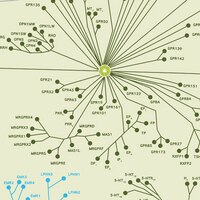HTS079M Sigma-AldrichChemiSCREEN™ Human VPAC2 VIP Receptor Membrane Preparation
Human VPAC2 / VIP2 GPCR membrane preparation for Radioligand binding Assays & GTPγS binding.
More>> Human VPAC2 / VIP2 GPCR membrane preparation for Radioligand binding Assays & GTPγS binding. Less<<Recommended Products
Overview
| Replacement Information |
|---|
Key Spec Table
| Species | Host Cells | Protein Target |
|---|---|---|
| Human | Chem-1 | VPAC2 / VIP2 |
| References |
|---|
| Product Information | |
|---|---|
| Format | Membranes |
| Presentation | Liquid in packaging buffer: 50 mM Tris pH 7.4, 10% glycerol and 1% BSA with no preservatives. Packaging method: Membranes protein were adjusted to the indicated concentration in packaging buffer, rapidly frozen, and stored at -80°C. |
| Quality Level | MQ100 |
| Physicochemical Information |
|---|
| Dimensions |
|---|
| Materials Information |
|---|
| Toxicological Information |
|---|
| Safety Information according to GHS |
|---|
| Safety Information |
|---|
| Storage and Shipping Information | |
|---|---|
| Storage Conditions | Maintain frozen at -70°C for up to 2 years. Do not freeze and thaw. |
| Packaging Information | |
|---|---|
| Material Size | 200 units |
| Transport Information |
|---|
| Supplemental Information |
|---|
| Specifications |
|---|
| Global Trade Item Number | |
|---|---|
| Catalogue Number | GTIN |
| HTS079M | 04053252406928 |
Documentation
ChemiSCREEN™ Human VPAC2 VIP Receptor Membrane Preparation SDS
| Title |
|---|
ChemiSCREEN™ Human VPAC2 VIP Receptor Membrane Preparation Certificates of Analysis
| Title | Lot Number |
|---|---|
| CHEMISCREENTM MEMBRANE PREPARATION RECOMBINANT HUMAN VPAC2 VIP/PACAP RECEPTOR - 2326017 | 2326017 |
References
| Reference overview | Pub Med ID |
|---|---|
| Aberrant gating of photic input to the suprachiasmatic circadian pacemaker of mice lacking the VPAC2 receptor Hughes, Alun T, et al J Neurosci, 24:3522-6 (2004) 2004 | 15071099
 |
| The significance of vasoactive intestinal peptide in immunomodulation Delgado, Mario, et al Pharmacol Rev, 56:249-90 (2004) 2004 | 15169929
 |
| c-Maf and JunB mediation of Th2 differentiation induced by the type 2 G Protein-Coupled Receptor (VPAC2) for vasoactive intestinal peptide. Voice J et al. J. Immunol., 172:7289-7296 (2004) 2004 | 15187104
 |
| International Union of Pharmacology. XVIII. Nomenclature of receptors for vasoactive intestinal peptide and pituitary adenylate cyclase-activating polypeptide Harmar, A J, et al Pharmacol Rev, 50:265-70 (1998) 1998 | 9647867
 |














